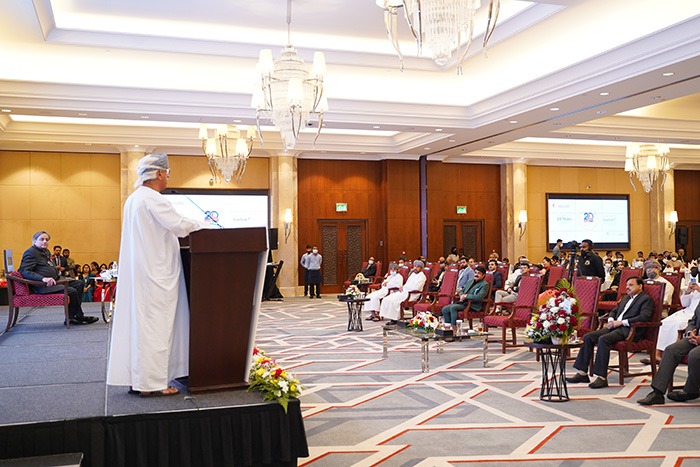
Muscat: Oman’s private healthcare institutions helped the government sector in lessening the impact of the COVID-19 pandemic on the country, the Minister of Health has said.
Minister of Health Dr Ahmed bin Mohammed Al Saeedi recently hailed private sector healthcare workers as “soldiers” for their assistance in combating the pandemic, and said the country owed them a debt of gratitude that could never be fully paid.
“Healthcare worldwide, unfortunately, had a very dramatic awakening with COVID-19,” he said. “There are so many lessons that we healthcare providers must learn from it, all over the world. In Oman, luckily, because of our surveillance system, because of our well-established primary healthcare system in public health, I think the impact was not as severe as it could have been.”
Addressing private healthcare sector representatives directly, he added: “Our partnership with the private sector, I think, was a good example here. You were all soldiers, looking after patients with COVID-19, day-in, day-out. This partnership will continue.
“The work all of you did over the last two years, no matter how much we thank you, I do not think we can repay you,” added the minister.
“Whether in the private sector or in the government, we worked as one unit, and we saved many lives together.”
The minister was speaking during an event organised by Badr Al Sama’a Hospitals to mark its 20 years of operations in Oman.
Just like how the pandemic has taken its toll on healthcare workers and facilities in the country, Ahmed Al Saeedi admitted that it had affected him as well.
“Over the last two years, I aged about 10 years, and had so many sleepless nights,” he revealed.
“When the pandemic started, we had, in the government sector, 156 ICU beds only. During the wave which came before Omicron, we reached 538 patients in ICUs, only for COVID, not all ICU cases. That’s a number across the country, but mainly in government hospitals.”
He did not hesitate, either, to remind people of a very important matter: “Unfortunately, the pandemic is not over yet.”
The minister added that he was doing plenty in his capacity in the World Health Organization to get COVID vaccines out to countries that do not have enough to go around and inoculate their people.
He said: “Unfortunately, worldwide, the inequity of (availability of) vaccines, therapeutics and diagnostics is so obvious. I am a very strong believer in global health. We have in Oman presented this issue and others to the Executive Board of the World Health Organisation. I am proud to say the Indian health minister last year was chairman of the Executive Board, and I was his vice chairman and we are calling for equity, not just in vaccines.
“There is a misconception in some governments that spending on healthcare is wasting money,” he added. “Spending on healthcare is the best investment you could make. Without healthcare, there would be no education, no economy, no progress…I think COVID-19 showed us that very clearly.”
Using Oman as an example of the importance of investment in healthcare, Al Saeedi pointed to the major improvements in people’s quality of life that have taken place over the last 50 or so years.
“The outcome in Oman is luckily because of the hard work of all of you, and we are very happy with it,” he said, once again addressing the private healthcare sector. “Our life expectancy in the 1970s was only 50 years for women and 48 for men. Today, life expectancy in Oman is 77 to 78 years. In the 1970s, almost 200 out of every 1,000 children did not live to celebrate their fifth birthday. Today, that number is less than seven.
All this was possible, he added, because of the support of the governments of late His Majesty Sultan Qaboos bin Said bin Taimour, and the current Sultan, His Majesty Sultan Haitham bin Tarik.
“Their support towards healthcare is continuous. In Oman, out of pocket spending is less than 12 percent, the rest of it is under the national health service,” he explained. “I am talking here about pre-COVID, but every year, because of healthcare expenses, 100 million people worldwide become poor. Here in Oman, His Majesty’s government will never allow that to happen. Ours is a national health service and will continue to be so.”
A keen proponent of investing money wisely, Al Saeedi added that it is not just how much money that is spent on healthcare that is important, but rather, how that money is used. To further elucidate this point, he referred to the health setup in Cuba, which is widely considered to have one of the best healthcare networks in the world.
“I was privileged to visit Cuba a few years ago…their health minister was appointed the same year I was, in 2010, and he came here just six months after he was appointed and we became friends, even though he didn’t speak any English and I don’t know Spanish,” recalled the minister.
“Their healthcare system is wonderful – they spend a fraction of what many countries spend on healthcare. Now, many people from the United States go to Cuba for healthcare,” he said. “In the United States, they spend about 18.5 percent of their GDP on healthcare, which is about $21,500 per person per year; in the OECD countries, it’s about $4,000 per person per year.
“In Oman, we are proud that we spend very little, but our outcomes are excellent,” he went on to say. “We spend, as a government, only $750 per person per year. It’s not about how much you spend, it’s also about how you use what you spend.”